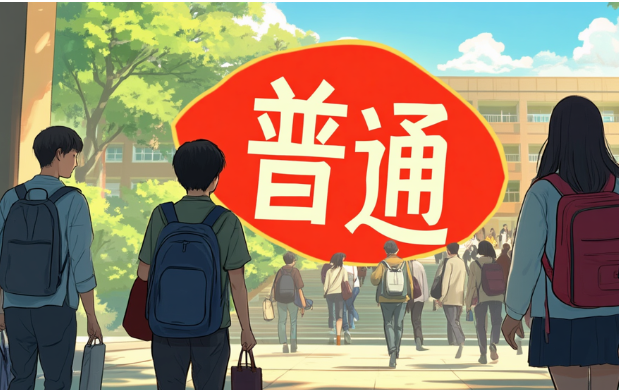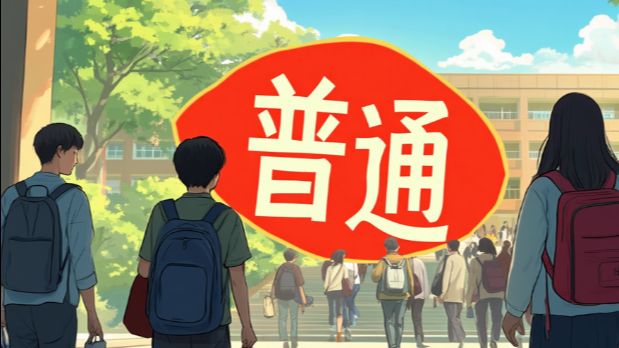In today's social environment where academicism is prevalent, a thought-provoking phenomenon is quietly spreading: many students who have passed their own efforts to get admitted to graduate school are shy because of their "ordinary" in their alma mater, especially in front of students from prestigious schools.

Xiao Ming’s story is by no means an isolated case, but represents the psychological dilemma of a huge group - they have realized their dream of academic promotion, but cannot get rid of the shadow of academic background. Behind this seemingly contradictory psychological state is the complex social comparison mechanism, identity conflict, cultural capital game and structural dilemma of self-worth, which requires us to conduct in-depth psychological analysis from multiple dimensions.
1. Distortion of self-evaluation under social comparative theory
Social psychologist Festinger's theory of social comparison points out that individuals evaluate themselves by comparing with others when they lack objective standards. The graduate education field has become a breeding ground for social comparison.
The pain of upward comparison: When Xiao Ming compared with a prestigious school student, he made an "upward comparison" - compared with people who think they are better than themselves. Although this comparison may provide motivation, it will often lead to impaired self-esteem and increased negative emotions. Students from prestigious schools not only exist as specific individuals, but also become a symbolic existence - representing the "ideal self" or the "self that should be". The comparison with them made Xiao Ming feel that there was an insurmountable gap between himself and his ideal state.
Internalization of school rankings: The hierarchical structure of the higher education system is strengthened and institutionalized through various rankings and reputations. This hierarchical structure not only exists in external evaluation, but is also internalized by individuals as part of self-worth. Students in second-tier universities often mistakenly equate school rankings with self-worth, forming a kind of "structural inferiority" - not because of their lack of personal abilities, but because their position is lower in the socially constructed hierarchy.
The psychological power of the halo effect: the halo of a prestigious school not only affects external evaluation, but also affects the individual's self-cognition. Xiao Ming may unconsciously accept the simple equation of "famous school = excellent", and then deduces the self-judgment of "not famous school = not excellent". This cognitive distortion ignores the diversity of individual efforts and practical abilities.
2. Identity conflict and self-concept split
The success of the postgraduate entrance examination brought Xiao Ming a new identity - "graduate student", but this new identity has a severe conflict with the original "second-tier graduate".
Incompleteness of identity transformation: Although Xiao Ming obtained a new academic identity through the postgraduate entrance examination, it may be difficult for him to fully identify with this new identity, because society is often classified based on the first education rather than the highest education. This popularity of "born theory" makes it difficult to transform identity, and new identities are as grafted onto old identities, making it difficult to organically integrate.
The breakdown of self-narrative: Everyone is constructing a coherent narrative about self. Xiao Ming's self-narration may contain the theme of "changing destiny through hard work", but the academic discrimination encountered in reality makes this narrative difficult to complete. His inferiority complex in front of students from prestigious schools reflects the gap between self-narrative and social recognition.
Dilemma of group identity: As a graduate student, Xiao Ming theoretically belongs to the academic elite group; as a second-tier graduate, he is also classified as an ordinary college group. This cross-group identity leads to an identity dilemma - it is difficult for him to fully integrate into the postgraduate group (because of different backgrounds) and to return to his original group (because he has been promoted). This "intermediate state" brings great sense of insecurity and lack of belonging.
3. Self-deprecation under cultural capital and symbolic violence
French sociologist Bourdieu's theory of cultural capital can help us understand the social roots of this sense of inferiority complex.
Form and Transformation of Cultural Capital: In the educational field, academic qualifications in prestigious schools are a kind of "institutionalized cultural capital" that can be easily identified and converted into social recognition and economic returns. The academic qualifications of ordinary colleges are a kind of cultural capital with limited recognition, and their conversion value is relatively low. Xiao Ming subconsciously perceived this difference in capital value, which led to self-deprecation.
Internalization of symbolic violence: Society implements "symbol violence" through a series of seemingly neutral evaluation criteria (such as school rankings and admission score lines) - a form of dominant dominance that the dominant is unintentionally collaboratively and participates. Xiao Ming's inferiority complex to prestigious school students is actually an internalization and acceptance of this symbolic violence - he acknowledged the legitimacy of the current hierarchy and placed himself under it.
The mismatch between habits and field: Bourdieu's concept of "habits" refers to the behavioral tendency formed by an individual through internalizing social structures. Xiao Ming may have retained the habits of students in ordinary colleges (including behavioral styles, conversation, social circles, etc.), while the graduate field requires another habit. This mismatch exacerbated his insecurity and self-doubt.
4. Achievement attribution model and self-worth conditioning
Xiao Ming’s psychological dilemma is also closely related to his attribution model of achievement and his self-worth definition.
External attribution tendency: Xiao Ming may attribute the success of the postgraduate entrance examination mainly to external factors (such as luck and exam skills), rather than internal factors (such as ability and effort). This attribution model weakens the self-esteem improvement brought by success, while strengthening doubts about one's own abilities.
Self-worth conditioning: Many people’s sense of self-worth is based on specific conditions ("I must...be valuable"). The self-worth condition for Xiao Ming may be: "I must come from a prestigious university to be a valuable graduate student." Because this condition is difficult to achieve, his sense of self-worth is constantly under threat.
The troubles of impostor syndrome: Many graduate students from non-prestigious universities experience "impostor syndrome" - feeling that they are not worthy of their location and are worried that others will find their "deficiency". This psychological state leads them to over-focus on their shortcomings and underestimate their achievements.
5. The path to social support and psychological adjustment
Faced with this psychological dilemma, individuals and society can intervene and adjust in a variety of ways.
Cognitive reconstruction strategies: Help individuals redefine success and value, shifting their focus from school background to personal growth and ability development. Recognize that education is only one dimension in life, not a reflection of all value.
Construction of diversified identity: Encourage individuals to develop diversified identity (such as professional abilities, interests, hobbies, interpersonal relationships, etc.) and avoid over-rely relying on their self-worth on their academic qualifications.
Supportive community building: Create support groups from graduate students in similar backgrounds to reduce the sense of isolation and abnormality through sharing experiences and mutual recognition.
Narrative Therapy Application: Construct a positive identity narrative by retelling one's own story, emphasizing the struggle process and inner strength. Redefine your second-tier experience as a proof of perseverance, rather than a shame that needs to be hidden.
Critical consciousness cultivation: Help individuals recognize the socially constructed nature of educational hierarchies, thereby "deinternalizing" these hierarchical standards to a certain extent and reducing their impact on self-evaluation.
Conclusion
Xiao Ming’s story reflects a profound psychological dilemma in China’s education system: behind the superficial academic promotion is the shadow of academic qualifications that is difficult to get rid of. This dilemma not only concerns personal psychological feelings, but also reveals the singularity and cruelty of the social evaluation system.
A truly healthy educational ecology should allow everyone to pursue excellence on different tracks, rather than squeeze all students into the same evaluation dimension; it should pay attention to individual growth and efforts, not just their position; it should encourage the realization of diverse values, rather than simplifying life into a competition of academic qualifications.
For countless "Xiao Mings", what is needed is not simply "improving self-confidence", but fundamentally rethinking the source of value and the meaning of life. Education can determine a person's starting point, but it should not define a person's end point; schools can provide resource platforms, but they cannot determine the height of personal growth.
Ultimately, we need to jointly build a more diverse and inclusive educational culture—in which each institution has its own unique value, every effort is seen and respected, and every individual can find its own completeness in imperfection. Only in this way can the joy of success in the postgraduate entrance examination not become the source of a new round of inferiority, but become a new starting point for true confident growth.
